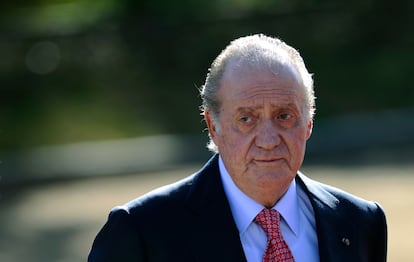Spain’s former king pays €678,393 in tax debt to avoid legal proceedings
Juan Carlos I is embroiled in two other court probes into alleged financial wrongdoing, but hopes that they will be dropped because of his immunity prior to his 2014 abdication

Spain’s emeritus king, Juan Carlos I, has paid €678,393 to tax authorities to settle debt on previously undisclosed income, according to a press release made public on Wednesday by the lawyers representing him.
The move seeks to avoid legal proceedings against the father of King Felipe VI, who took the throne in 2014 following Juan Carlos’s abdication. Prosecutors at the Supreme Court had been investigating the former monarch’s alleged use of credit cards drawing from funds made available by a personal friend, a Mexican businessman named Allen Sanginés-Krause.
Juan Carlos “remains, as he has always been, available to prosecutors for any procedure or action they see fit,” reads the release, which is signed by his lawyer Javier Sánchez-Junco, a former anti-corruption prosecutor specializing in financial crimes.
Article 305.4 of Spain’s Criminal Code establishes that by voluntarily paying one’s dues before being formally notified of proceedings, either by tax authorities or by the justice system, the irregularities will no longer be liable to prosecution. If the Tax Agency considers that the former king’s tax affairs are now in order, he will not only be freed from proceedings for potential tax crimes, but also for any other related crimes such as money laundering.
Unknown wealth
All that is known about Juan Carlos’s wealth is the annual stipend that he officially received as a member of the royal household until 2019, when he was assigned €161,000. In March, Felipe VI stripped the emeritus king of the stipend following a series of allegations about financial wrongdoing.
Juan Carlos is already facing two other investigations by the Supreme Court. One involves alleged commissions for a contract that was awarded to a Spanish consortium to build a high-speed train to Mecca, but the events are prior to his 2014 abdication, meaning that he still enjoyed immunity, and prosecutors are expected to drop the proceedings. The other probe is investigating Juan Carlos’s alleged ties to companies held in tax havens.
The amount paid to settle his tax dues is a fraction of what Juan Carlos has allegedly kept in foreign bank accounts for years. In 2008, he received a gift of $100 million (€65 million at the exchange rate then) by Abdullah bin Abdulaziz, who was the king of Saudi Arabia at the time, according to documents obtained by Swiss justice officials from Arturo Fasana, the emeritus king’s wealth manager. In June 2012, Juan Carlos emptied out his account at the Swiss bank Mirabaud, transferring all the funds to his former lover Corinna Larsen.
Living in the UAE
Juan Carlos, who reigned for nearly 40 years and guided the country through a peaceful transition to democracy following the death of dictator Francisco Franco, is now living in the United Arab Emirates. His sudden departure from Spain in August, and the fact that his whereabouts remained unknown for two weeks, have drawn criticism from several political parties, including one of the governing coalition partners, the leftist Unidas Podemos.
On Wednesday, Prime Minister Pedro Sánchez of the Socialist Party (PSOE) said that despite the former king’s financial scandals, the future of the Spanish monarchy is not at risk. In a statement aimed at one of his own deputy prime ministers, Unidas Podemos leader Pablo Iglesias, Sánchez said on the private television network Telecinco that “the monarchy is not in danger.”
Edmundo Bal, the spokesperson for the center-right Ciudadanos (Citizens), criticized the former monarch’s behavior. “Juan Carlos’s voluntary filing reflects the fact that he has been concealing money of questionable origin,” he said. “It is morally reprehensible. He did Spain a great service for many years, and our democracy owes him a lot, but this behavior is disappointing.”
English version by Susana Urra.
Tu suscripción se está usando en otro dispositivo
¿Quieres añadir otro usuario a tu suscripción?
Si continúas leyendo en este dispositivo, no se podrá leer en el otro.
FlechaTu suscripción se está usando en otro dispositivo y solo puedes acceder a EL PAÍS desde un dispositivo a la vez.
Si quieres compartir tu cuenta, cambia tu suscripción a la modalidad Premium, así podrás añadir otro usuario. Cada uno accederá con su propia cuenta de email, lo que os permitirá personalizar vuestra experiencia en EL PAÍS.
¿Tienes una suscripción de empresa? Accede aquí para contratar más cuentas.
En el caso de no saber quién está usando tu cuenta, te recomendamos cambiar tu contraseña aquí.
Si decides continuar compartiendo tu cuenta, este mensaje se mostrará en tu dispositivo y en el de la otra persona que está usando tu cuenta de forma indefinida, afectando a tu experiencia de lectura. Puedes consultar aquí los términos y condiciones de la suscripción digital.








































